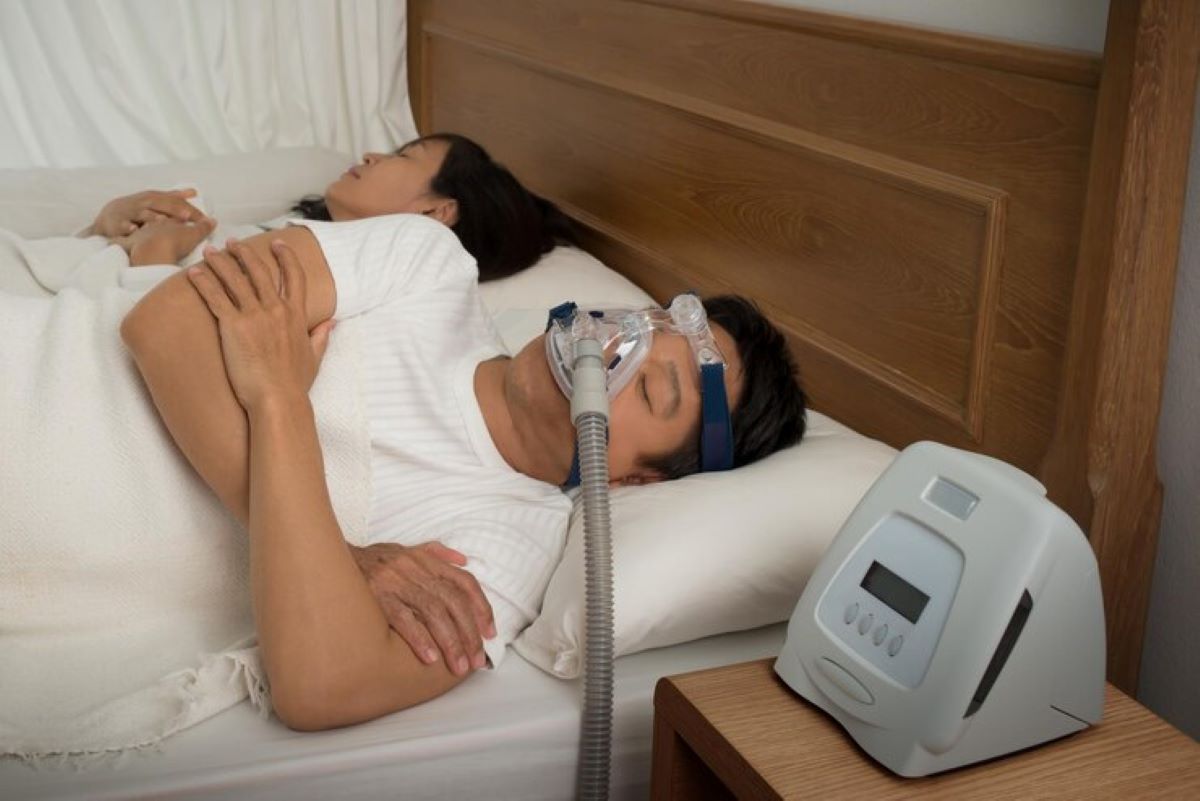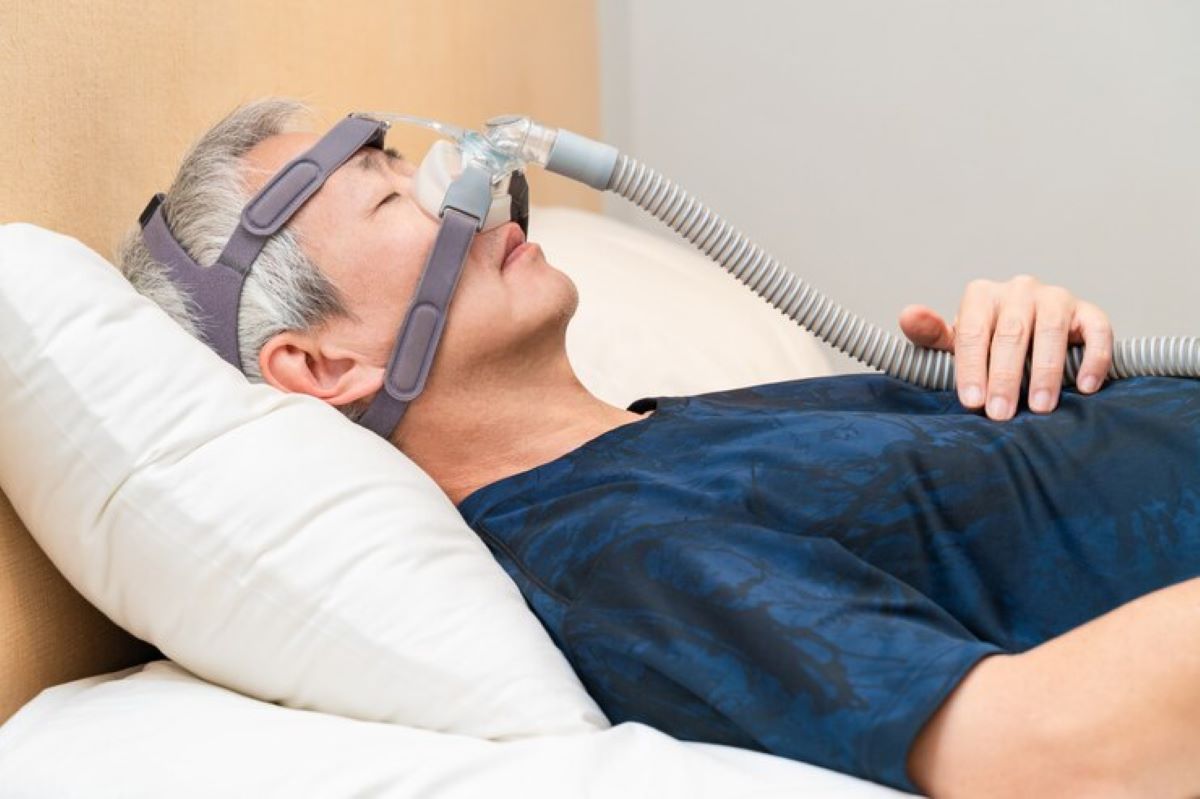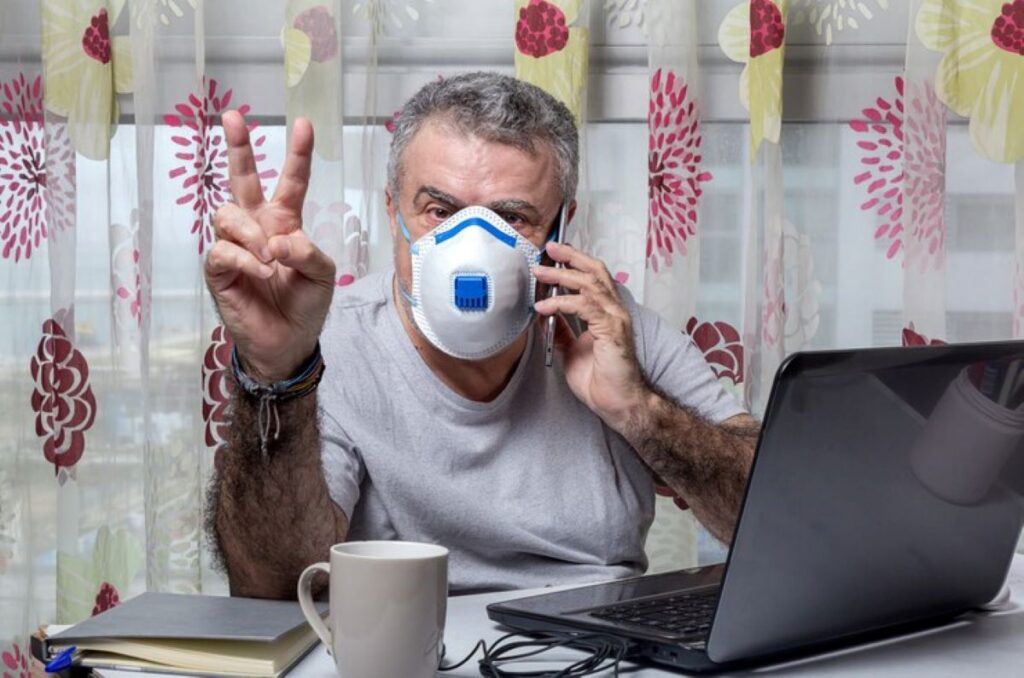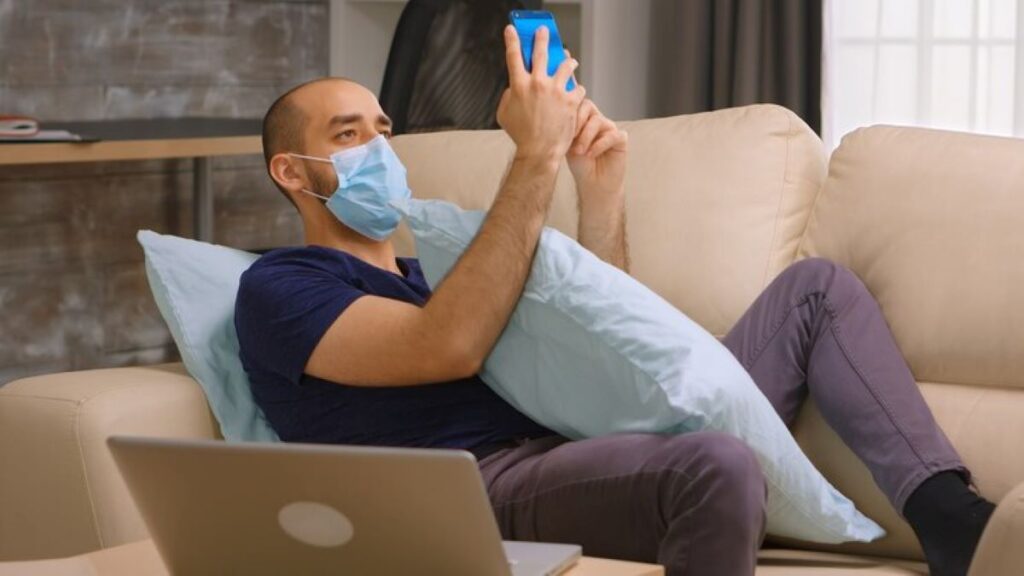What Is a CPAP Mask and How Does It Work?
A CPAP mask is an essential part of your CPAP machine that you wear while sleeping. Its main job is to deliver a steady stream of air pressure directly into your airways, keeping them open and preventing any breathing interruptions caused by sleep apnea.
How Does It Work?
Here’s how the CPAP mask works in conjunction with your CPAP machine:
- The CPAP machine generates a continuous flow of pressurised air.
- This air travels through a flexible tube connected to the mask.
- The mask creates a secure seal around your nose or mouth (depending on the type) to ensure no air escapes.
- As you breathe in and out during sleep, the pressurised air from the machine flows into your upper airway, keeping it open and allowing for uninterrupted breathing.
Why Is Choosing the Right CPAP Mask Important?
Selecting the appropriate CPAP mask is crucial for effective treatment. Here’s why:
- An ill-fitting mask can lead to air leaks, reducing the effectiveness of therapy.
- Uncomfortable pressure points from a poorly fitting mask may cause skin irritation.
- If the mask shifts or comes off during sleep, it can disrupt your rest and compromise therapy.
- Inconsistent use of prescribed therapy due to discomfort or inconvenience can hinder progress.
Your individual factors such as sleeping position, breathing patterns, and personal comfort preferences play a significant role in determining which type of mask will work best for you.
What Are the Different Types of CPAP Masks Available?
Understanding the various CPAP mask types available helps you make an informed decision that aligns with your specific needs and sleeping habits. Each mask design offers distinct advantages depending on your breathing patterns, comfort preferences, and sleep position requirements.
1. Full-Face Mask
The full-face CPAP mask covers both your nose and mouth, creating a complete seal around the lower portion of your face. This comprehensive design makes it the ideal choice for mouth breathers who naturally breathe through their mouth during sleep or experience nasal congestion that forces mouth breathing.
Key features of full-face masks:
- Complete coverage of nose and mouth areas
- Larger cushion surface for secure seal
- Effective for users with higher pressure requirements
- Suitable for those who switch between nose and mouth breathing
Full-face masks work exceptionally well for back sleepers because this sleeping position naturally maintains the mask’s alignment and prevents seal disruption. The stable positioning reduces the likelihood of air leaks that can compromise therapy effectiveness.
You’ll find that full-face masks typically feature adjustable headgear with multiple straps to distribute pressure evenly across your head. This design helps maintain a comfortable fit throughout the night whilst ensuring consistent air delivery. The larger surface area also accommodates users who require higher CPAP pressures, as the seal remains stable even with increased airflow demands.
2. Nasal Mask
Nasal CPAP masks cover your nose completely, creating a secure seal around the nasal area whilst leaving your mouth free. These masks are one of the most popular CPAP mask types due to their balanced approach between coverage and comfort.
Who Should Use a Nasal Mask?
Ideal candidates for nasal masks include:
- Nose breathers who naturally breathe through their nostrils during sleep
- Active sleepers who frequently change positions throughout the night
- Patients seeking a middle ground between full-face coverage and minimal contact
For active sleepers, it’s essential to choose a CPAP mask that accommodates frequent position changes throughout the night. The nasal mask design provides excellent stability for restless sleepers without the bulk of a full-face option.
Benefits of Nasal Masks
The nasal CPAP mask design provides excellent stability for restless sleepers without the bulk of a full-face option. You’ll find these masks particularly effective if you maintain consistent nasal breathing patterns and don’t experience significant mouth breathing during sleep. The secure fit accommodates various sleeping positions whilst delivering consistent air pressure through your nasal passages, making them a versatile choice for many CPAP users seeking reliable therapy delivery.
3. Nasal Pillow Mask
Nasal pillow CPAP masks represent the most minimalist approach amongst CPAP mask types. These innovative devices feature small, soft cushions that rest directly at your nostrils rather than covering your entire nose like traditional nasal masks.
The minimal design makes nasal pillow masks particularly appealing for:
- Side sleepers who need freedom of movement without mask displacement
- Stomach sleepers requiring the least facial coverage possible
- Active sleepers who frequently change positions during the night
- Users who feel claustrophobic with larger mask designs
You’ll find nasal pillow masks especially beneficial if you wear glasses or enjoy reading before sleep, as they don’t interfere with eyewear. The lightweight construction reduces pressure points on your face, making them ideal for extended wear. However, these masks work best for nose breathers and may not suit you if you require higher pressure settings or tend to breathe through your mouth during sleep.
For side sleepers using a nasal pillow mask, it’s crucial to adopt successful sleeping positions to maximize comfort and effectiveness of the CPAP therapy.
4. Hybrid Mask
Hybrid CPAP masks are the newest type of CPAP mask, cleverly combining the best features of both nasal and full-face designs. These masks have nasal pillows that sit directly in your nostrils and a mouth cushion beneath your nose, creating a unique dual-seal system.
The hybrid CPAP mask design addresses common challenges you might face with traditional mask styles:
- Reduced facial contact compared to full-face masks
- Enhanced stability for active sleepers
- Mouth breathing accommodation without the bulk of a full-face mask
- Minimal headgear requirements for improved comfort
You’ll find hybrid masks particularly beneficial if you experience claustrophobia with full-face CPAP masks but still need mouth coverage during sleep. The innovative design maintains effective air pressure delivery whilst offering the freedom of movement that nasal pillow mask users appreciate, making them suitable for various sleeping positions and breathing patterns.
How Does Sleeping Position Affect the Choice of CPAP Mask?
Your sleeping position CPAP mask selection plays a crucial role in determining therapy success and comfort throughout the night. Different sleep positions create unique challenges for mask seal, stability, and overall effectiveness of your CPAP treatment.
The way you position yourself during sleep directly impacts how your mask interacts with your pillow, bedding, and facial contours. This interaction affects air pressure delivery, mask displacement, and potential air leaks that can compromise your therapy effectiveness.
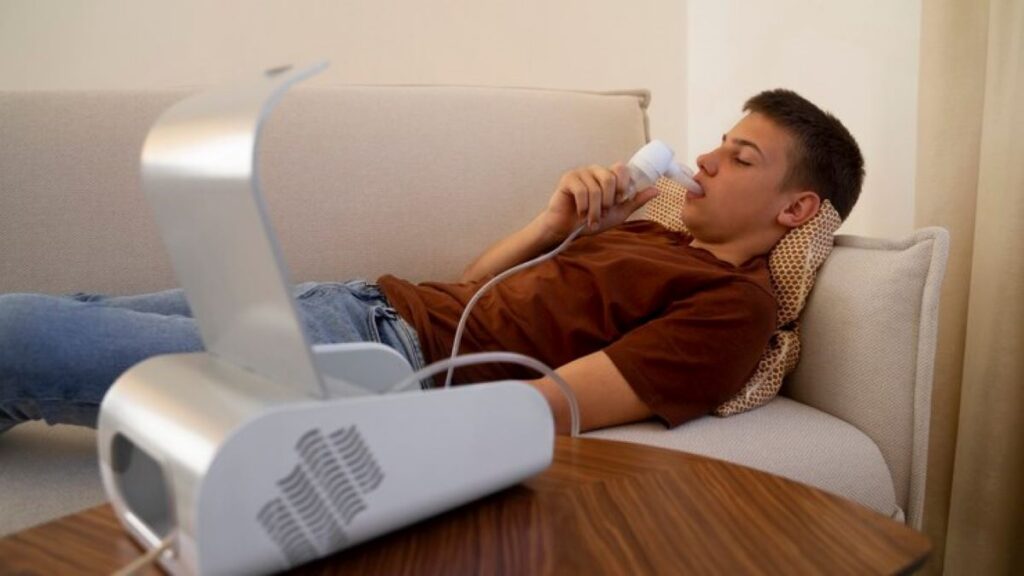
1. Side Sleepers
Side sleeper CPAP mask requirements differ significantly from other sleeping positions due to pillow contact and facial pressure points. When you sleep on your side, traditional full-face masks often experience pressure from your pillow, leading to air leaks and uncomfortable shifting throughout the night.
Nasal pillow masks represent the optimal choice for side sleepers because of their minimal contact area and low profile design. These masks sit directly at your nostrils without extending across your cheeks or mouth, eliminating pillow interference. The compact design allows you to move freely between left and right sides without compromising the seal.
Nasal masks with specialised pillows also work effectively for side sleepers. CPAP-specific pillows feature cutout sections that accommodate mask positioning whilst maintaining proper spinal alignment. These pillows prevent mask displacement and reduce facial pressure points that commonly occur when standard pillows push against larger mask surfaces.
You’ll find that side sleeping with the right mask choice reduces therapy interruptions and improves your overall sleep quality.
2. Back Sleepers
Back sleepers have the most flexibility when choosing a CPAP mask because their airway stays in a stable position throughout the night. When you sleep on your back, your airway naturally stays aligned, which means you can pick from a wide range of CPAP mask options without any major limitations.
The importance of sleeping position in choosing the right CPAP mask is especially clear for back sleepers, as this position avoids many of the fitting issues that other sleeping styles face. You can comfortably use:
- Full-face masks – Great if you breathe through your mouth or have nasal congestion
- Nasal masks – Perfect for consistent nose breathing
- Nasal pillow masks – Suitable for those who prefer minimal contact on their face
Your stable head position prevents the mask from shifting and losing its seal, which is a common problem for side and stomach sleepers. This compatibility between your sleeping position and CPAP masks means you can focus on your comfort preferences and breathing habits rather than being limited by your position when making your choice.
3. Stomach Sleepers
Choosing the right CPAP mask for stomach sleepers can be tricky. When you sleep on your stomach, regular masks can press against your pillow, causing uncomfortable air leaks and disrupted sleep. This is especially true for stomach sleepers, as bulkier masks tend to shift or come off during the night.
Why Nasal Pillow Masks are Ideal for Stomach Sleepers
Nasal pillow masks are the best choice for stomach sleepers because they are small and lightweight. Unlike full-face or traditional nasal masks that cover a larger area, nasal pillow masks only sit at your nostrils without extending far from your face. This design allows you to comfortably press your face into the pillow without affecting the seal of the mask.
Benefits of Nasal Pillow Masks for Stomach Sleepers
- Freedom of Movement: With nasal pillow masks, you can move naturally in your sleep without worrying about mask displacement.
- Consistent Therapy Pressure: The compact design of nasal pillow masks ensures that therapy pressure remains steady throughout the night, providing effective treatment for sleep apnea.
By choosing a nasal pillow mask as your CPAP solution, you’ll be able to enjoy a restful night’s sleep while still receiving the necessary therapy for your condition.
What Comfort Factors Should Be Considered When Selecting a CPAP Mask?
CPAP mask comfort directly impacts your therapy success and sleep quality. You need to evaluate several key elements when selecting your mask to ensure consistent nightly use.
1. Headgear Adjustability
Headgear adjustability plays a crucial role in achieving the perfect fit. Look for masks with multiple adjustment points that allow you to customise the tension without creating pressure points on your face or head. Quality headgear systems distribute pressure evenly across contact areas.
2. Cushion Softness
Cushion softness determines how comfortable the mask feels against your skin throughout the night. Silicone cushions typically offer superior comfort compared to harder materials, whilst gel-infused options provide additional softness for sensitive skin.
3. Air Leak Prevention
Air leak prevention requires proper seal maintenance without excessive tightness. The right mask should create an effective seal at lower headgear tensions, reducing the risk of red marks, discomfort, and therapy interruptions. You’ll find that masks with dual-wall cushions or memory foam often provide better sealing capabilities whilst maintaining comfort levels essential for successful CPAP therapy adherence.
How Do Individual Breathing Habits Influence Mask Choice?
Your natural breathing patterns play a crucial role in determining which CPAP mask will work best for you. Mouth breathers require different considerations than those who breathe primarily through their nose during sleep.
Mouth Breathers
If you’re a mouth breather, a mouth breathing CPAP mask such as a full-face mask becomes essential. These masks cover both your nose and mouth, ensuring you receive proper air pressure regardless of whether you breathe through your mouth, nose, or both. Without adequate coverage, mouth breathing can lead to air leaks and reduced therapy effectiveness.
Nose Breathers
Nose breathers have more flexibility with their nose breathing CPAP mask options. Nasal masks and nasal pillow masks work exceptionally well for consistent nose breathers, offering a lighter feel and less facial coverage. These masks direct airflow specifically through your nasal passages.
Mixed Breathers
Some people experience mixed breathing patterns, alternating between nose and mouth breathing throughout the night. You might start as a nose breather but switch to mouth breathing due to congestion or sleep position changes. In these cases, full-face masks provide the versatility needed to maintain effective therapy regardless of breathing pattern shifts.
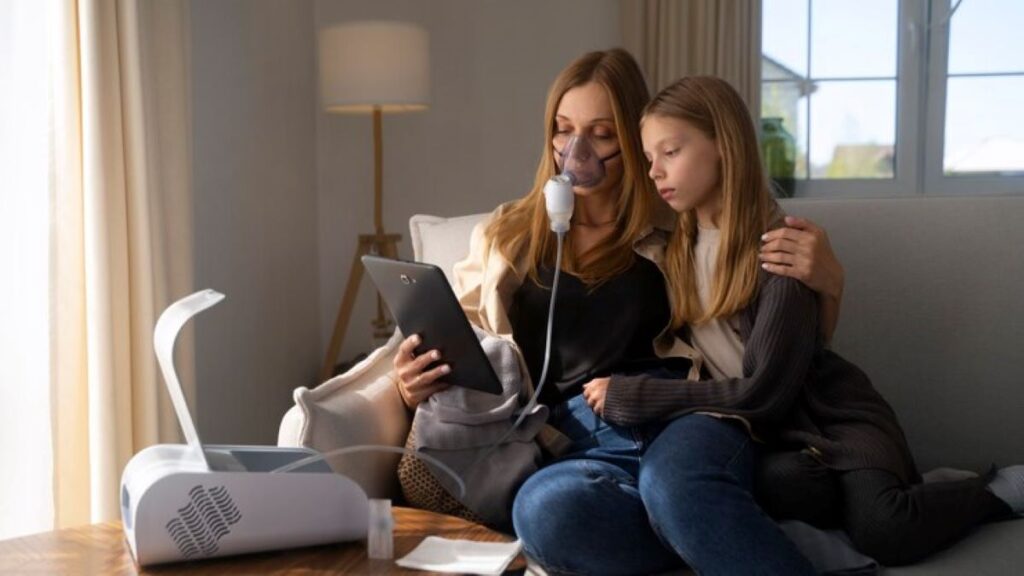
What Other Factors Should Patients Consider When Choosing a CPAP Mask?
Several practical considerations extend beyond sleeping position and breathing patterns when selecting your ideal CPAP mask.
1. Facial Hair
Facial hair significantly impacts mask seal effectiveness, with beards and moustaches creating gaps that compromise air pressure delivery. Full-face masks often struggle with facial hair CPAP mask fit issues, making nasal pillows a preferred alternative for bearded users.
2. Skin Sensitivity
Your skin sensitivity determines which cushion materials work best for nightly wear. Silicone cushions suit most users, whilst gel alternatives provide enhanced comfort for sensitive skin types.
Change block type or style
Move Paragraph block from position 95 up to position 94
Block Paragraph is at the end of the content and can’t be moved down
Change text alignment
Displays more block tools
blob:https://norfolkeye.net/e45c8016-7bb2-4033-82ac-004f16f21e90
How to Choose the Best CPAP Mask for Your Sleeping Style
A CPAP mask is an essential part of your CPAP machine that you wear while sleeping. Its main job is to deliver a steady stream of air
3. Claustrophobia Concerns
Claustrophobia concerns influence mask selection, with nasal pillows offering the least restrictive feeling compared to full-face designs.
4. Prescription Glasses
Prescription glasses wearers need masks that accommodate eyewear without creating pressure points or seal disruptions.
5. Frequency of Colds or Allergies
The frequency of colds or allergies affects your ability to breathe through your nose consistently, potentially requiring backup mask options for congested periods.
Why Is Professional Support Important in Selecting the Best CPAP Mask?
Professional guidance in choosing a CPAP mask transforms what can feel like an overwhelming decision into a personalised journey towards better sleep. Sleep specialists and respiratory therapists possess the clinical expertise to evaluate your unique needs beyond what you might consider on your own.
Healthcare professionals conduct comprehensive assessments that examine your facial structure, breathing patterns, and medical history. They can identify potential complications you might overlook, such as nasal congestion issues that could affect mask performance or skin sensitivities that require specific materials.
Key benefits of professional support include:
- Access to mask fitting sessions that ensure proper seal and comfort
- Adjustment of CPAP pressure settings to work optimally with your chosen mask
- Ongoing monitoring to track treatment effectiveness
- Troubleshooting support when issues arise
- Insurance guidance and coverage assistance
Air Liquide Healthcare’s network of 152 diagnostic and therapy service locations across Australia provides this essential professional support. Their respiratory specialists work directly with patients to ensure optimal mask selection and ongoing care.
You shouldn’t navigate CPAP therapy alone. Professional support significantly improves treatment compliance rates and sleep quality outcomes. When you work with experienced healthcare providers, you’re more likely to find the right mask quickly and stick with your therapy long-term. How to Choose the Best CPAP Mask for Your Sleeping Style becomes much clearer with expert guidance supporting your decision-making process.
More to Read : Buy CPAP Mask Online: Trusted Retailers and What to Look For


